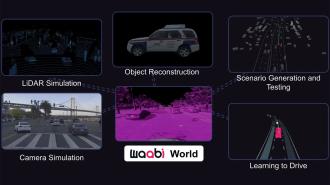Canadian autonomous truck startup Waabi has developed a new way to put self-driving cars through their paces: a digital world driving school.
Dubbed Waabi World, the simulation throws various challenges the AI’s way, helping to suss out weak points in the program and give it countless hours of learning experience to better navigate the endless variables of real-world roads.
Think of the self-driving AI like a teenager with their license, Axios’ Joann Muller writes; they can’t know it all yet, but they get more confident and capable the longer they’re behind the wheel and face adversity.
So Waabi World gives them a challenge
“Waabi World plays adversary against the Waabi driver,” Raquel Urtasun, CEO of Waabi and University of Toronto AI professor, told the Globe and Mail. “It can learn to understand its vulnerabilities … and create the scenarios automatically that will make the system fail.”
By pitting the driver against their digital driving school, Waabi hopes to develop a better kind of self-driving AI, rather than relying on a fleet of vehicles covering millions of real-world miles, Urtasun told the Verge.
If a self-driving AI were a human driver, it’d be like a teenager: it needs time and experience to learn.
Autonomous driving school: Autonomous vehicles are powered by deep learning AI, which needs vast amount of data to “learn” basic facts — what a person looks like, what a stop sign looks like, what a tree looks like — and then hit the brakes if it sees any one of them in its path. That data can be verified and labeled by people, and it can come from testing in the real world.
More and more, it’s coming from simulations, Urtasun told the Verge: “But there is still big gaps from current simulators to this ultimate simulator that will really enable self-driving to not rely on driving millions and millions of miles on the real world to really understand whether vehicles are actually doing the right thing.”
It’s a gap many self-driving prototypes have fallen into. Videos of Tesla’s beta version of “Full Self-Driving” mode being befuddled by road conditions — braking unexpectedly, not braking expectedly — and battling drivers for control have cropped up on YouTube.
Waabi world is a digital twin of the world, a virtual driving school.
“[It] shows that FSD beta is still fazed by edge cases that it hasn’t learned to navigate, yet most human drivers would handle with ease,” Andrew Maynard, a professor at Arizona State, told the Washington Post.
Teaching FSD to learn and solve problems like a human would be the best way to train it, Maynard said, but compared to feeding it reams of data, that “is exceptionally hard to emulate in a machine.”
Which is where Waabi World hopes to step in.
A whole new world: The simulated world Waabi has designed as an AI driving school / Danger Room has four key abilities, the company said in a blog post.
Waabi World creates accurate, data-driven digital twins of the world, down to the rain drops, the Verge reported. It simulates the sensor abilities of the vehicle navigating that world in near real-time to test all of the vehicle’s systems holistically — do all the different sensors and programs work together?
Waabi World can create challenges to stress-test AI drivers, teaching them to learn from their mistakes.
And it can develop challenges to stress-test the AI driver in that world, and use them to teach the AI to learn from its mistakes, in a human-like way, without human input.
“It’s like really understanding where you can make mistakes and then creating all these scenarios,” Urtasun told the Verge.
We’d love to hear from you! If you have a comment about this article or if you have a tip for a future Freethink story, please email us at [email protected].






